Татьяна
Мне тоже в детстве говорили: билет в кино- вон стоит в углу.
2.5. Who Wants to Be a God?
Amongst my most amazing impressions of China are those of elderly people. Wake up early, around six in the morning, and go out to the streets – you will watch big groups of elders doing exercises and dancing with fans. There are nearly no youngsters in such groups as they have many good reasons to ignore morning activities – sleeping late, going to work and simply having more important things to do. But grandpas and grandmas selflessly make strokes with swords, jolt fans to the accompaniment of drum and cymbals and obviously enjoy themselves. This pleasure and enjoyment is not limited only to the morning collective exercises but lasts all day long, peaking again during evening dancing. Warm Beijing evening is filled with hissing sounds of old cassette recorders or with familiar sounds of drums and cymbals – it is time to dance. The same elderly people in pairs or one by one move enthusiastically.
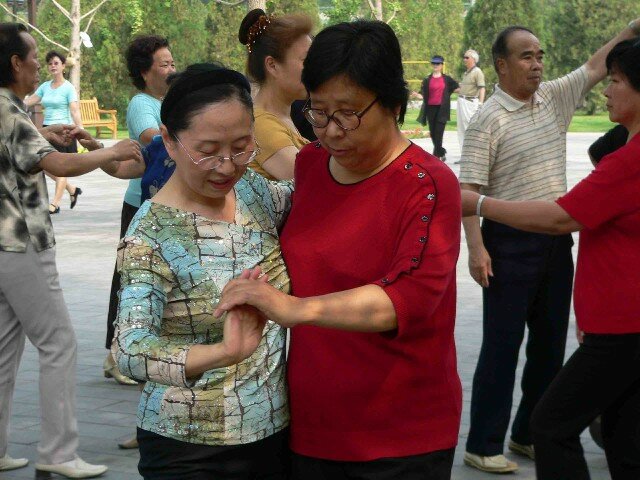
Take another morning entertainment – calligraphy. In China characters inscription have always been considered an art, calligraphic poems are exhibited in museums and galleries along with pictures. Good calligrapher has a strong hand and thus writing characters is a kind of physical exercise. Every Beijing park is full of elderly people (one small detail – there nearly no women among them) writing poems on a pavement or stone plates with a long stick with a sponge on its top used instead of a brush. Sponge is often moistened with water. These calligraphic masterpieces are quick to dry but writers are not distressed – they start their exercises again and again.
The favorite daytime entertainment of the aged is chess. In China this game is not an individual sport as we used to think but a collective one. Near houses and along cities’ highways, big groups of old men gather, divide for teams and – go ahead, the game starts! One moves figures and the team actively and noisily elaborates strategy and tactics.
Simple pleasures like drinking tea and talking about bygone youth are also very popular. Elders seat together, drink their tea, talking slowly but one of them – suddenly – suggests something like “why not to do some taiji?”, others nod assent, stand up, make some stances and move and then go back to their routine – tea and talking. It is a touching picture, indeed.
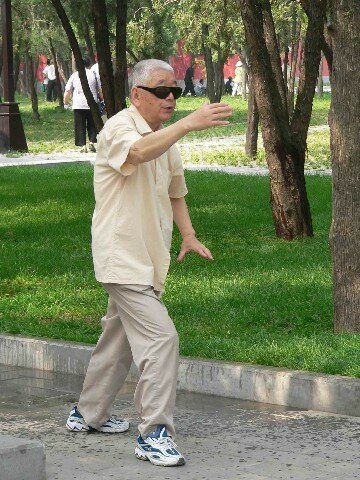
Attitude of the Chinese to the aged is very different from that we have back home. According to local ideas, at the age of 60, a brand new life starts. This idea comes from zodiac beliefs. Previous astrological cycle – five times by 12 years, full turnover of the astrological circle – is finished and it is time to get all possible pleasures of life.
Filial piety is the fundamental principle of China’s traditional way of life, unshakable for centuries. If unchallenged and never doubted respect towards elders, parents and superiors is gone, China will lose its roots. And a tree without roots can not survive.
Filial piety and respect is fundament of all fundaments, the most important of all Confucius maxims. Filial piety and concern about elders are source of all virtues. China has many stories about model examples of filial piety telling about loving sons and daughters. One of the most striking examples of such piety is Emperor Qianlong himself (r. 1736–1796) under whom China was considered the most prosperous country of the world.
Qianlong voluntarily retired from the state affairs after 60 years on the throne – just because his grandfather Emperor Kangxi ruled for the same number of years. Qianlong didn’t want somebody to doubt his respect for his grandfather – who was great emperor – by ruling longer than he had done.
Existed family rituals verified clan hierarchy and some of those rituals living up to these days have modified a little. Family members gathering around the table during lunar New Year celebrations used to kowtow to the family patriarch saying “I owe!” A saying goes: “If you not obey to elders you will live 10 years less”.
There was proper upbringing in China. Customs did not allow not only disrespect for elders but also condemned any aggressive behavior of children because family in China has always been considered a prototype of the society: anything threatening to peace and harmony of the family potentially can destroy stability of the society.
Policy was a continuation of the family way of life. Attitude towards the head of the family was repeated in attitude towards a superior and further along all bureaucratic hierarchy right up to the emperor. In some aspects these relationships are still in place that make easier building socialism with Chinese specifics and implementing reforms. Confucius’ canons affirm that for good ruling of the country the ruler must cope with family affairs and troubles very well and for maintaining peace in the family one must devote him to self-education.
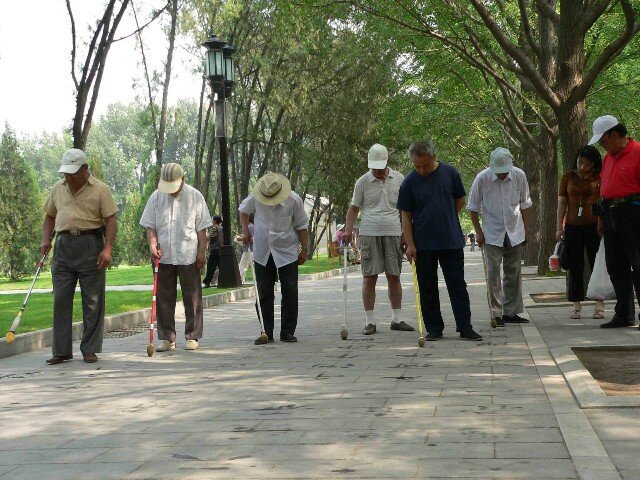
Without question, many things changed but filial piety is one of the corner stones on which China has been built. This is one of the reasons for such a moving attitude towards the aged, long-livers in particular. For every 100,000 people in the country there are three of 100 years old and elder on average. In some regions the number is higher which is surge of pride for both local authorities and inhabitants of the blessed region. For example, there are 122 centenarians in the city of Leshan, Sichuan Province. Researchers think that the main reasons for such long-living are geographical position and environment. Scientists also believe that other factors such as physical labor, open character, material sufficiency and filial children are of equal importance. Those living a long live usually enjoy harmonious family relations and often themselves are model examples of filial piety. They are respected members of the family and enjoy the life that turned out exactly as the ancient Chinese rule promised: when you grow old you are the respected and well-to-do person enjoying simple pleasures of life.
Another famous place for the aged in China is Hainan Island. It is often referred to as “Longevity Island” as there are more than 90,000 people older than 90. In 2001 the local authorities held a special festival to choose the island’s “God of Longevity”.
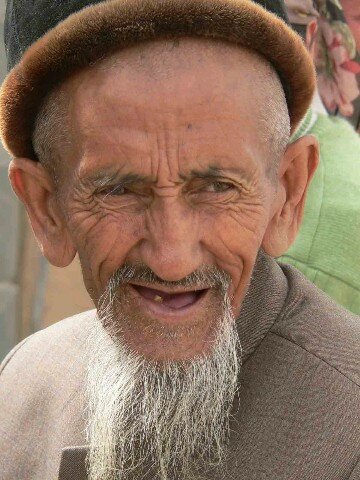
When the competition was announced nearly all 90-years old local people presented their applications willing to become gods. One 96-years old man went 2.5 kilometers to submit application in person. Asked why he didn’t send grandson or great-grandson he answered proudly: “Are there any other possibilities to prove I am healthy?” The point is that the competition terms were strict: competitors should be at least 90 years old, in a good health, with strong legs and hands, good vision and hearing, they should be able to make some work in fields, communicate with others on a regular basis, to have a good family and good relations with neighbors and – last but not least – to be enthusiastic for healthy life style. Not every young man can comply with all these requirements, let alone grandpas and grandmas!
Thirty nine elders made it to the final and every one of them was awarded with the title “Outstanding Hainan Old Resident”. Hu Kaiyuan, 110-years old, was declared the “God of Longevity” for his good health, harmonious family relations and venerable age. While awarding the certificate Hainan Vice-Governor wished Hu Kaiyuan to live up to 200 years. “Thank you”, answered the old man, “but my son wished me to live up to 300 years”. Everybody in attendance laughed quite long after these words.
What are the secrets of long-living? Elders of Hainan say they are work and good mood. Take “God” Hu as example: all his life he worked in the field and went fishing at sea. Even after he celebrated centenary he is able to go one kilometer to his son’s shop to chat with friends.
What do you think about traditional Chinese family? Three or four generations living under one roof: bald-headed and white-bearded great-great-grandfather living together with five grandpas, ten fathers and dozens of children. It is next to impossible to find such a family in contemporary China. That was the ancient custom – surrounded by grandchildren and great-grandchildren the old saw that their life was not for nothing. Children, for their turn, knew that when they grow old they also would have peaceful and easy old years and if they fall sick there always be somebody to take care of them. This was the Chinese way of life.
In recent years a new trend has come to life – parents and children live separately. Widowed elders try to marry again as the traditional conception of four musts for the old Chinese – house, savings, wife (husband) and friends – is still very much alive.
There are more than 132 million people in China at the age of 60 and older. It is expected there will be around 400 million of them in 2050, quarter of all population of the country.
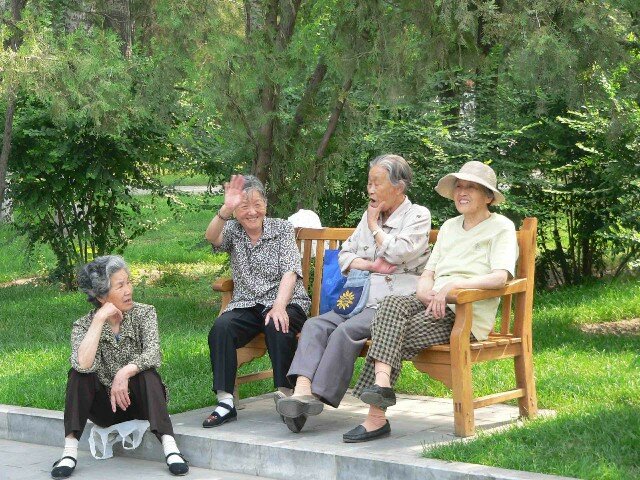
Book “Chinese Customs and Wisdoms” (translated into English by the author) was published in Beijing in 2007 by the Foreign Language Press
Комментариев (0)